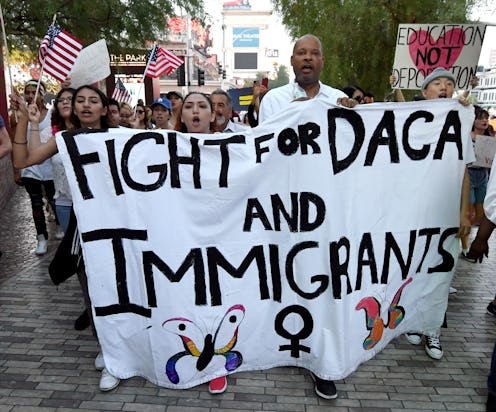News
Here's What The New DACA Ruling Means For Dreamers

On Tuesday, a federal judge from the Northern District of California applied an injunction against the Trump administration's ending of the Deferred Action for Childhood Arrivals program, which protects nearly 700,000 "Dreamers" who immigrated to the United States as children. So are Dreamers safe now, having been partially protected under the program?
The attorneys general of California, Maine, Minnesota, and Maryland sued the federal government in September over its decision to terminate DACA. Because of that pending lawsuit, Judge William Alsup granted DACA recipients temporary "provisional relief," meaning that they can continue to renew their applications until litigation about the program is finalized.
Alsup's ruling compels the Department of Homeland Security to begin accepting DACA renewal applications again and to "post reasonable public notice" that it is about to do so. Theoretically, this provides immediate protection to all Dreamers who are or have been covered by the program — most pertinently, those whose DACA protections were set to expire even before the entire program was set to end in March.
Around 120 Dreamers per day have been losing these protections since Trump announced the end of the program, which leaves these young people vulnerable to deportation. Previous DACA recipients whose protections have already expired should also be able to renew their applications under this court injunction.
To justify the injunction, Judge Alsup argued that the plaintiffs in the ongoing legal challenge to the administration's DACA decision "have shown a likelihood of success on their claim" that the action was not in accordance with the law "because it was based on the flawed legal premise that [DHS] lacked authority to implement DACA."
Alsup noted that new administrations may create their own policies to replace old ones, but that these new policies must be legal and that the Department of Homeland Security's judgement on ending DACA was "based on a mistake of law." He also argued that the Dreamers who were protected by the program would "suffer serious irreparable harm" if a court did not order this temporary relief.
This is definitely great news for past and present DACA recipients, and especially those whose protections are about to expire. But it isn't the end of the story, and doesn't mean that Dreamers — or even just DACA recipients — are safe from deportation yet.
First of all, the terms of the injunction only apply until the lawsuit from the California, Maine, Minnesota, and Maryland attorneys general reaches a conclusion. The Trump administration will be allowed to end DACA in March as planned if those plaintiffs are unsuccessful. In that case, the only real benefit of this court ruling will have been delaying the immediate threat of deportation for people whose protections expired earlier than March.
Second, this injunction will probably be challenged by the federal government. If so, it will go to the U.S. Court of Appeals for the Ninth Circuit, which — because it is famously liberal — will probably allow Judge Alsup's ruling to proceed. If the government then continues to challenge the injunction, it will end up in the Supreme Court. The outcome in that scenario is less certain because the Court currently has a slight conservative bent. But it's also true that protecting Dreamers has bipartisan support.
It seems hopeful that DACA will be protected, either by legal intervention or by pressure from Democrats as Congress negotiates a government spending bill. But that still only helps the approximately 700,000 Dreamers who had been covered by the act. Other undocumented Dreamers — whose number can only be estimated, but could be well over a million — will remain vulnerable.
Only a permanent law can truly protect Dreamers. But this legal challenge is an important, and immediate, step.